Dissertation: How Reward Systems Affect Employee Performance
VerifiedAdded on 2023/06/05
|6
|1261
|420
Dissertation
AI Summary
This dissertation provides a comprehensive analysis of the impact of reward systems on employee performance. It begins with an introduction to the concept of reward systems, differentiating between intrinsic and extrinsic rewards and their role in aligning employee goals with organizational objectives. The study highlights the importance of reward systems in employee motivation, skill enhancement, and retention, addressing the problem of demotivation due to inadequate recognition and poorly designed reward structures. The research aims to understand the effect of reward systems on employee performance, ascertain the concept of reward systems, analyze their impact on employee performance, and determine the challenges in managing these systems. Employing a qualitative research methodology with an interpretivism philosophy and inductive approach, the study gathers data from primary and secondary sources to provide an in-depth understanding of the topic, culminating in recommendations to improve reward system management and enhance employee performance.
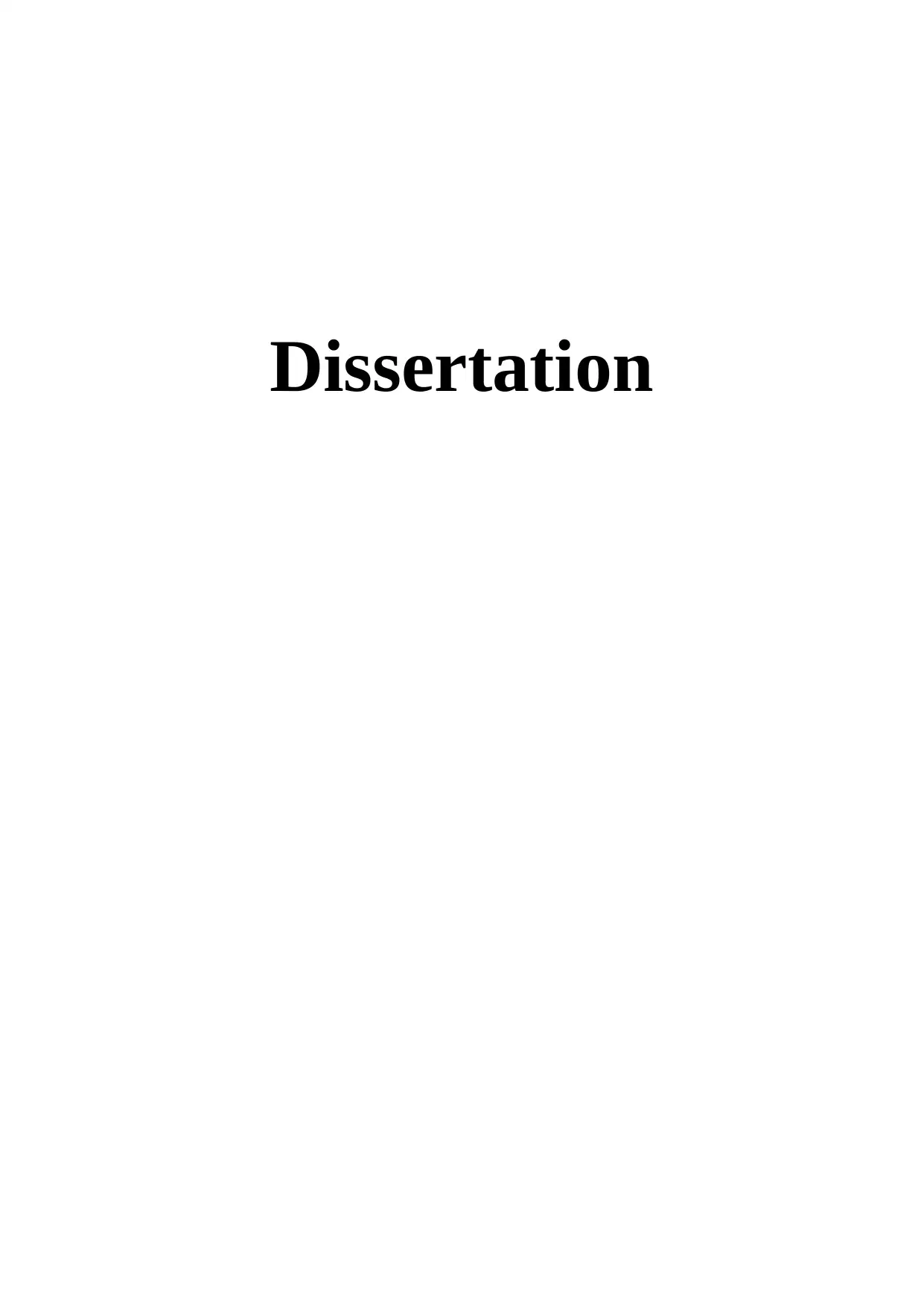
Dissertation
Paraphrase This Document
Need a fresh take? Get an instant paraphrase of this document with our AI Paraphraser
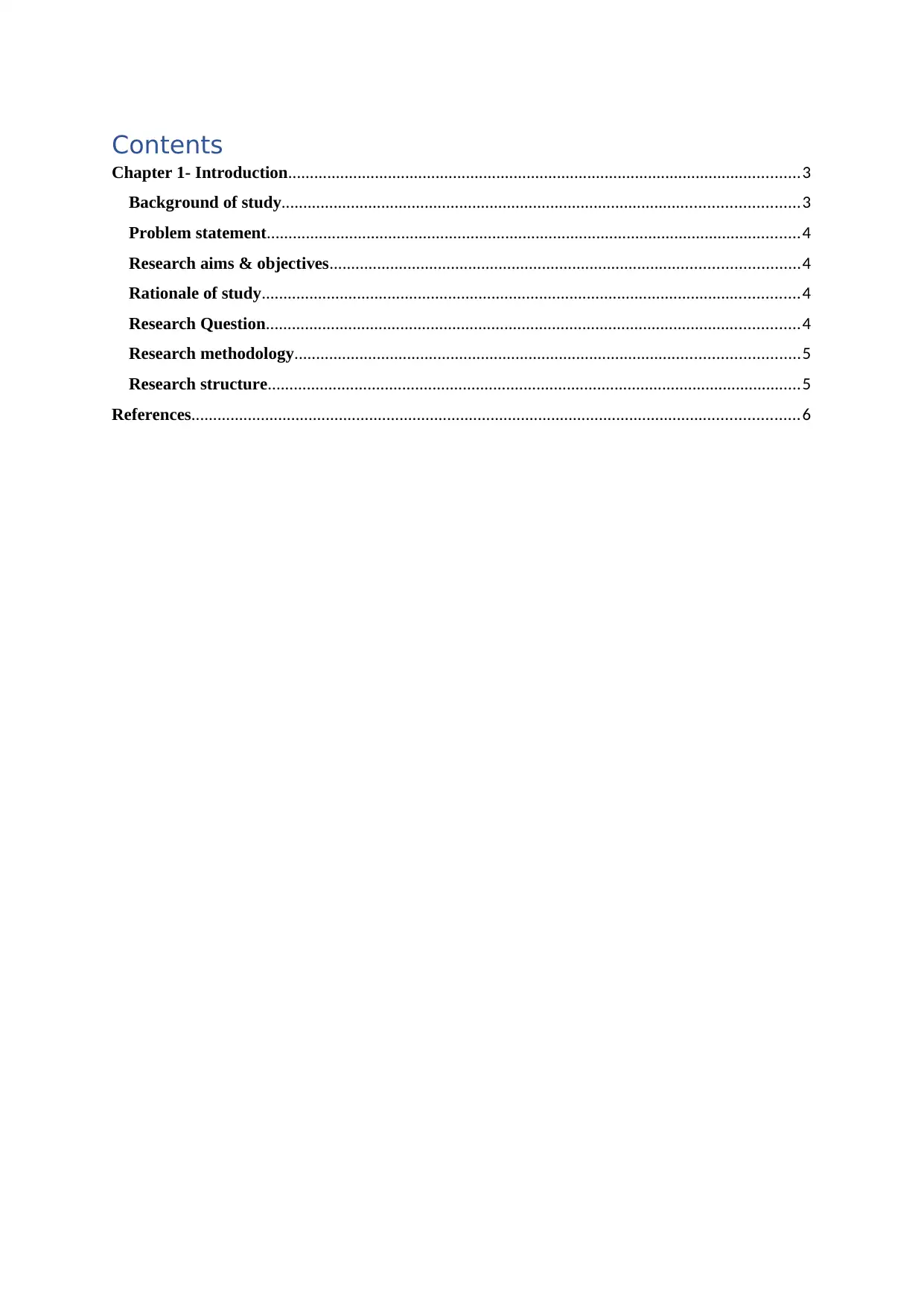
Contents
Chapter 1- Introduction......................................................................................................................3
Background of study.......................................................................................................................3
Problem statement...........................................................................................................................4
Research aims & objectives............................................................................................................4
Rationale of study............................................................................................................................4
Research Question...........................................................................................................................4
Research methodology....................................................................................................................5
Research structure...........................................................................................................................5
References............................................................................................................................................6
Chapter 1- Introduction......................................................................................................................3
Background of study.......................................................................................................................3
Problem statement...........................................................................................................................4
Research aims & objectives............................................................................................................4
Rationale of study............................................................................................................................4
Research Question...........................................................................................................................4
Research methodology....................................................................................................................5
Research structure...........................................................................................................................5
References............................................................................................................................................6
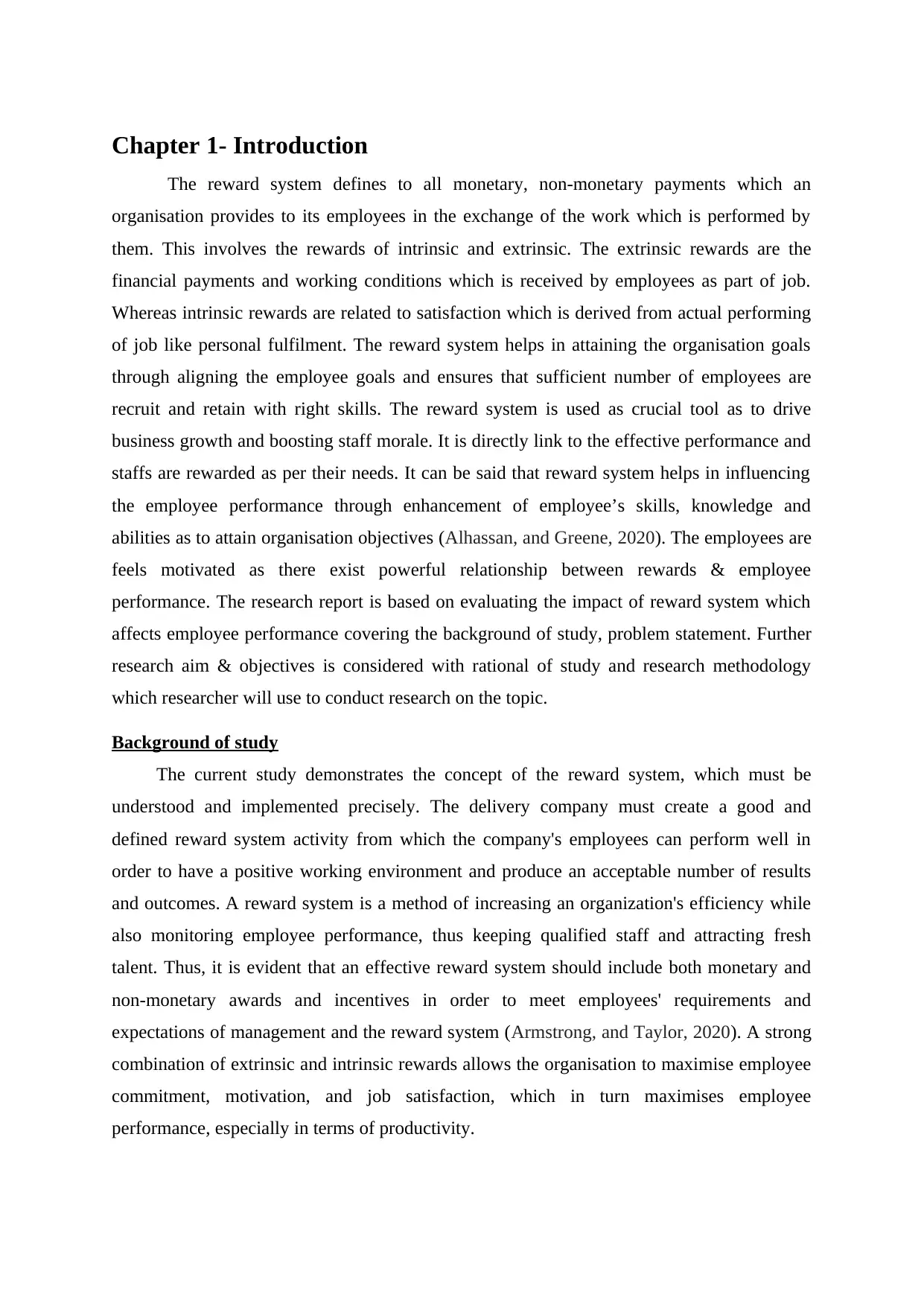
Chapter 1- Introduction
The reward system defines to all monetary, non-monetary payments which an
organisation provides to its employees in the exchange of the work which is performed by
them. This involves the rewards of intrinsic and extrinsic. The extrinsic rewards are the
financial payments and working conditions which is received by employees as part of job.
Whereas intrinsic rewards are related to satisfaction which is derived from actual performing
of job like personal fulfilment. The reward system helps in attaining the organisation goals
through aligning the employee goals and ensures that sufficient number of employees are
recruit and retain with right skills. The reward system is used as crucial tool as to drive
business growth and boosting staff morale. It is directly link to the effective performance and
staffs are rewarded as per their needs. It can be said that reward system helps in influencing
the employee performance through enhancement of employee’s skills, knowledge and
abilities as to attain organisation objectives (Alhassan, and Greene, 2020). The employees are
feels motivated as there exist powerful relationship between rewards & employee
performance. The research report is based on evaluating the impact of reward system which
affects employee performance covering the background of study, problem statement. Further
research aim & objectives is considered with rational of study and research methodology
which researcher will use to conduct research on the topic.
Background of study
The current study demonstrates the concept of the reward system, which must be
understood and implemented precisely. The delivery company must create a good and
defined reward system activity from which the company's employees can perform well in
order to have a positive working environment and produce an acceptable number of results
and outcomes. A reward system is a method of increasing an organization's efficiency while
also monitoring employee performance, thus keeping qualified staff and attracting fresh
talent. Thus, it is evident that an effective reward system should include both monetary and
non-monetary awards and incentives in order to meet employees' requirements and
expectations of management and the reward system (Armstrong, and Taylor, 2020). A strong
combination of extrinsic and intrinsic rewards allows the organisation to maximise employee
commitment, motivation, and job satisfaction, which in turn maximises employee
performance, especially in terms of productivity.
The reward system defines to all monetary, non-monetary payments which an
organisation provides to its employees in the exchange of the work which is performed by
them. This involves the rewards of intrinsic and extrinsic. The extrinsic rewards are the
financial payments and working conditions which is received by employees as part of job.
Whereas intrinsic rewards are related to satisfaction which is derived from actual performing
of job like personal fulfilment. The reward system helps in attaining the organisation goals
through aligning the employee goals and ensures that sufficient number of employees are
recruit and retain with right skills. The reward system is used as crucial tool as to drive
business growth and boosting staff morale. It is directly link to the effective performance and
staffs are rewarded as per their needs. It can be said that reward system helps in influencing
the employee performance through enhancement of employee’s skills, knowledge and
abilities as to attain organisation objectives (Alhassan, and Greene, 2020). The employees are
feels motivated as there exist powerful relationship between rewards & employee
performance. The research report is based on evaluating the impact of reward system which
affects employee performance covering the background of study, problem statement. Further
research aim & objectives is considered with rational of study and research methodology
which researcher will use to conduct research on the topic.
Background of study
The current study demonstrates the concept of the reward system, which must be
understood and implemented precisely. The delivery company must create a good and
defined reward system activity from which the company's employees can perform well in
order to have a positive working environment and produce an acceptable number of results
and outcomes. A reward system is a method of increasing an organization's efficiency while
also monitoring employee performance, thus keeping qualified staff and attracting fresh
talent. Thus, it is evident that an effective reward system should include both monetary and
non-monetary awards and incentives in order to meet employees' requirements and
expectations of management and the reward system (Armstrong, and Taylor, 2020). A strong
combination of extrinsic and intrinsic rewards allows the organisation to maximise employee
commitment, motivation, and job satisfaction, which in turn maximises employee
performance, especially in terms of productivity.
⊘ This is a preview!⊘
Do you want full access?
Subscribe today to unlock all pages.

Trusted by 1+ million students worldwide
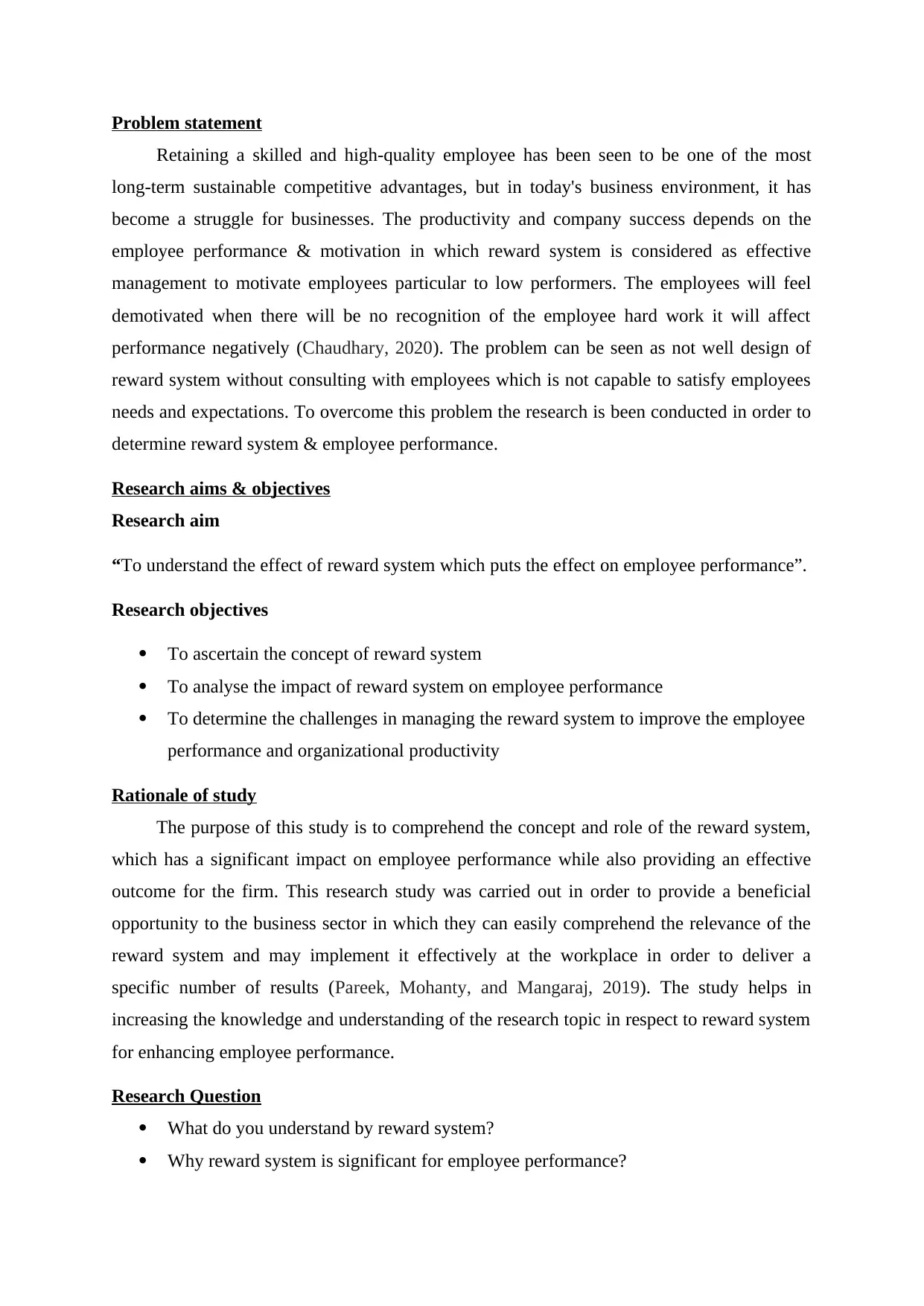
Problem statement
Retaining a skilled and high-quality employee has been seen to be one of the most
long-term sustainable competitive advantages, but in today's business environment, it has
become a struggle for businesses. The productivity and company success depends on the
employee performance & motivation in which reward system is considered as effective
management to motivate employees particular to low performers. The employees will feel
demotivated when there will be no recognition of the employee hard work it will affect
performance negatively (Chaudhary, 2020). The problem can be seen as not well design of
reward system without consulting with employees which is not capable to satisfy employees
needs and expectations. To overcome this problem the research is been conducted in order to
determine reward system & employee performance.
Research aims & objectives
Research aim
“To understand the effect of reward system which puts the effect on employee performance”.
Research objectives
To ascertain the concept of reward system
To analyse the impact of reward system on employee performance
To determine the challenges in managing the reward system to improve the employee
performance and organizational productivity
Rationale of study
The purpose of this study is to comprehend the concept and role of the reward system,
which has a significant impact on employee performance while also providing an effective
outcome for the firm. This research study was carried out in order to provide a beneficial
opportunity to the business sector in which they can easily comprehend the relevance of the
reward system and may implement it effectively at the workplace in order to deliver a
specific number of results (Pareek, Mohanty, and Mangaraj, 2019). The study helps in
increasing the knowledge and understanding of the research topic in respect to reward system
for enhancing employee performance.
Research Question
What do you understand by reward system?
Why reward system is significant for employee performance?
Retaining a skilled and high-quality employee has been seen to be one of the most
long-term sustainable competitive advantages, but in today's business environment, it has
become a struggle for businesses. The productivity and company success depends on the
employee performance & motivation in which reward system is considered as effective
management to motivate employees particular to low performers. The employees will feel
demotivated when there will be no recognition of the employee hard work it will affect
performance negatively (Chaudhary, 2020). The problem can be seen as not well design of
reward system without consulting with employees which is not capable to satisfy employees
needs and expectations. To overcome this problem the research is been conducted in order to
determine reward system & employee performance.
Research aims & objectives
Research aim
“To understand the effect of reward system which puts the effect on employee performance”.
Research objectives
To ascertain the concept of reward system
To analyse the impact of reward system on employee performance
To determine the challenges in managing the reward system to improve the employee
performance and organizational productivity
Rationale of study
The purpose of this study is to comprehend the concept and role of the reward system,
which has a significant impact on employee performance while also providing an effective
outcome for the firm. This research study was carried out in order to provide a beneficial
opportunity to the business sector in which they can easily comprehend the relevance of the
reward system and may implement it effectively at the workplace in order to deliver a
specific number of results (Pareek, Mohanty, and Mangaraj, 2019). The study helps in
increasing the knowledge and understanding of the research topic in respect to reward system
for enhancing employee performance.
Research Question
What do you understand by reward system?
Why reward system is significant for employee performance?
Paraphrase This Document
Need a fresh take? Get an instant paraphrase of this document with our AI Paraphraser
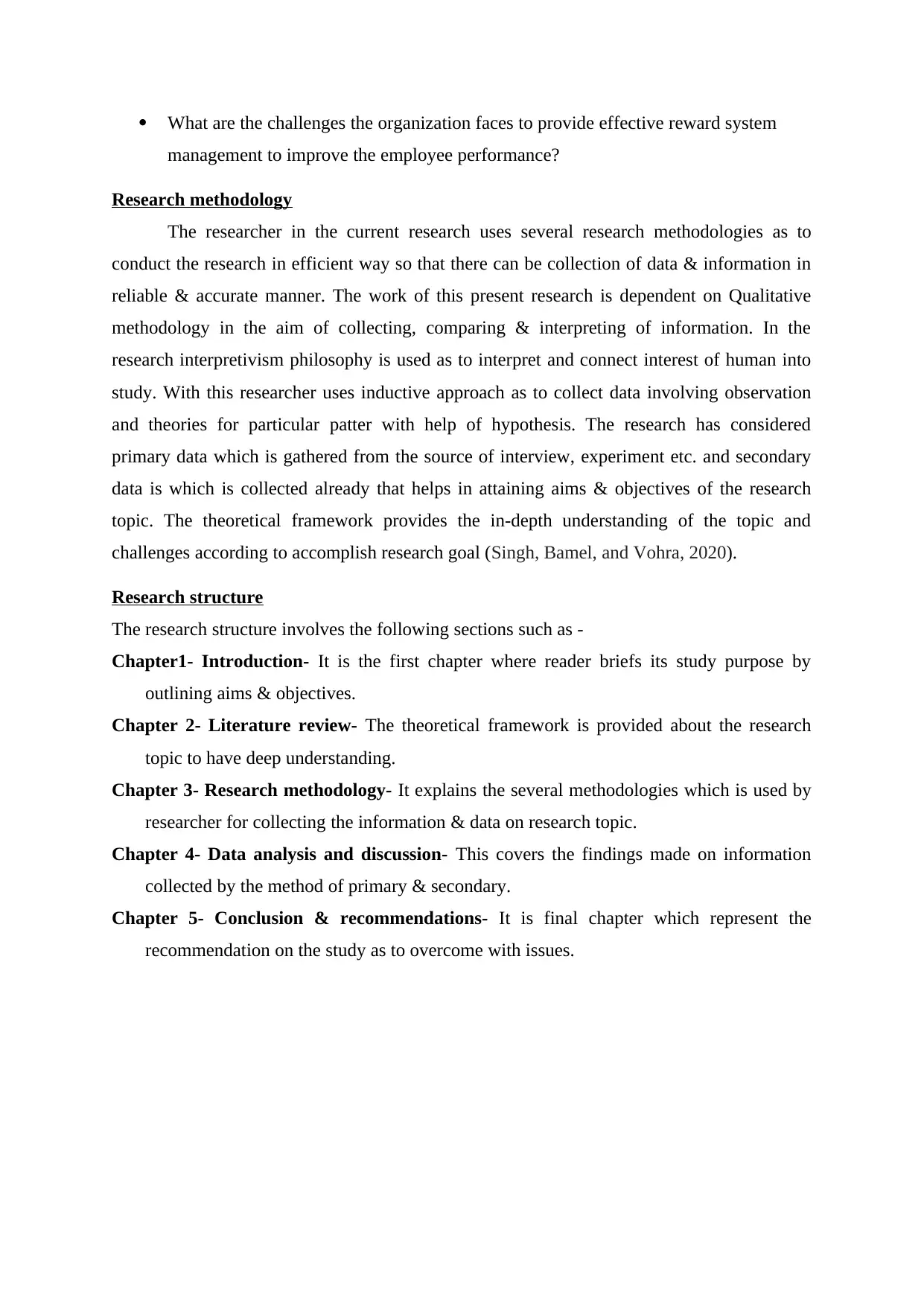
What are the challenges the organization faces to provide effective reward system
management to improve the employee performance?
Research methodology
The researcher in the current research uses several research methodologies as to
conduct the research in efficient way so that there can be collection of data & information in
reliable & accurate manner. The work of this present research is dependent on Qualitative
methodology in the aim of collecting, comparing & interpreting of information. In the
research interpretivism philosophy is used as to interpret and connect interest of human into
study. With this researcher uses inductive approach as to collect data involving observation
and theories for particular patter with help of hypothesis. The research has considered
primary data which is gathered from the source of interview, experiment etc. and secondary
data is which is collected already that helps in attaining aims & objectives of the research
topic. The theoretical framework provides the in-depth understanding of the topic and
challenges according to accomplish research goal (Singh, Bamel, and Vohra, 2020).
Research structure
The research structure involves the following sections such as -
Chapter1- Introduction- It is the first chapter where reader briefs its study purpose by
outlining aims & objectives.
Chapter 2- Literature review- The theoretical framework is provided about the research
topic to have deep understanding.
Chapter 3- Research methodology- It explains the several methodologies which is used by
researcher for collecting the information & data on research topic.
Chapter 4- Data analysis and discussion- This covers the findings made on information
collected by the method of primary & secondary.
Chapter 5- Conclusion & recommendations- It is final chapter which represent the
recommendation on the study as to overcome with issues.
management to improve the employee performance?
Research methodology
The researcher in the current research uses several research methodologies as to
conduct the research in efficient way so that there can be collection of data & information in
reliable & accurate manner. The work of this present research is dependent on Qualitative
methodology in the aim of collecting, comparing & interpreting of information. In the
research interpretivism philosophy is used as to interpret and connect interest of human into
study. With this researcher uses inductive approach as to collect data involving observation
and theories for particular patter with help of hypothesis. The research has considered
primary data which is gathered from the source of interview, experiment etc. and secondary
data is which is collected already that helps in attaining aims & objectives of the research
topic. The theoretical framework provides the in-depth understanding of the topic and
challenges according to accomplish research goal (Singh, Bamel, and Vohra, 2020).
Research structure
The research structure involves the following sections such as -
Chapter1- Introduction- It is the first chapter where reader briefs its study purpose by
outlining aims & objectives.
Chapter 2- Literature review- The theoretical framework is provided about the research
topic to have deep understanding.
Chapter 3- Research methodology- It explains the several methodologies which is used by
researcher for collecting the information & data on research topic.
Chapter 4- Data analysis and discussion- This covers the findings made on information
collected by the method of primary & secondary.
Chapter 5- Conclusion & recommendations- It is final chapter which represent the
recommendation on the study as to overcome with issues.
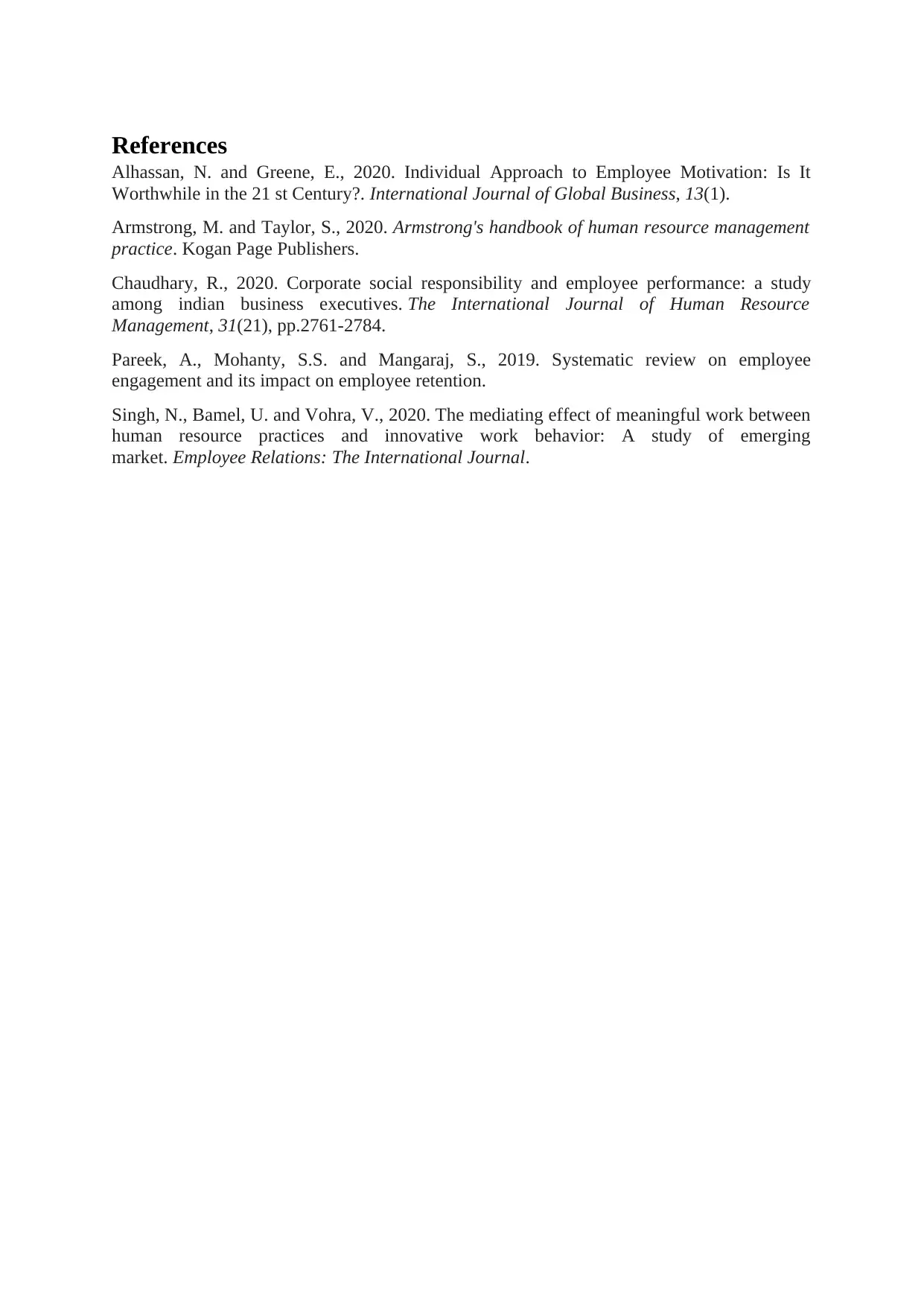
References
Alhassan, N. and Greene, E., 2020. Individual Approach to Employee Motivation: Is It
Worthwhile in the 21 st Century?. International Journal of Global Business, 13(1).
Armstrong, M. and Taylor, S., 2020. Armstrong's handbook of human resource management
practice. Kogan Page Publishers.
Chaudhary, R., 2020. Corporate social responsibility and employee performance: a study
among indian business executives. The International Journal of Human Resource
Management, 31(21), pp.2761-2784.
Pareek, A., Mohanty, S.S. and Mangaraj, S., 2019. Systematic review on employee
engagement and its impact on employee retention.
Singh, N., Bamel, U. and Vohra, V., 2020. The mediating effect of meaningful work between
human resource practices and innovative work behavior: A study of emerging
market. Employee Relations: The International Journal.
Alhassan, N. and Greene, E., 2020. Individual Approach to Employee Motivation: Is It
Worthwhile in the 21 st Century?. International Journal of Global Business, 13(1).
Armstrong, M. and Taylor, S., 2020. Armstrong's handbook of human resource management
practice. Kogan Page Publishers.
Chaudhary, R., 2020. Corporate social responsibility and employee performance: a study
among indian business executives. The International Journal of Human Resource
Management, 31(21), pp.2761-2784.
Pareek, A., Mohanty, S.S. and Mangaraj, S., 2019. Systematic review on employee
engagement and its impact on employee retention.
Singh, N., Bamel, U. and Vohra, V., 2020. The mediating effect of meaningful work between
human resource practices and innovative work behavior: A study of emerging
market. Employee Relations: The International Journal.
⊘ This is a preview!⊘
Do you want full access?
Subscribe today to unlock all pages.

Trusted by 1+ million students worldwide
1 out of 6
Related Documents
Your All-in-One AI-Powered Toolkit for Academic Success.
+13062052269
info@desklib.com
Available 24*7 on WhatsApp / Email
![[object Object]](/_next/static/media/star-bottom.7253800d.svg)
Unlock your academic potential
Copyright © 2020–2025 A2Z Services. All Rights Reserved. Developed and managed by ZUCOL.





